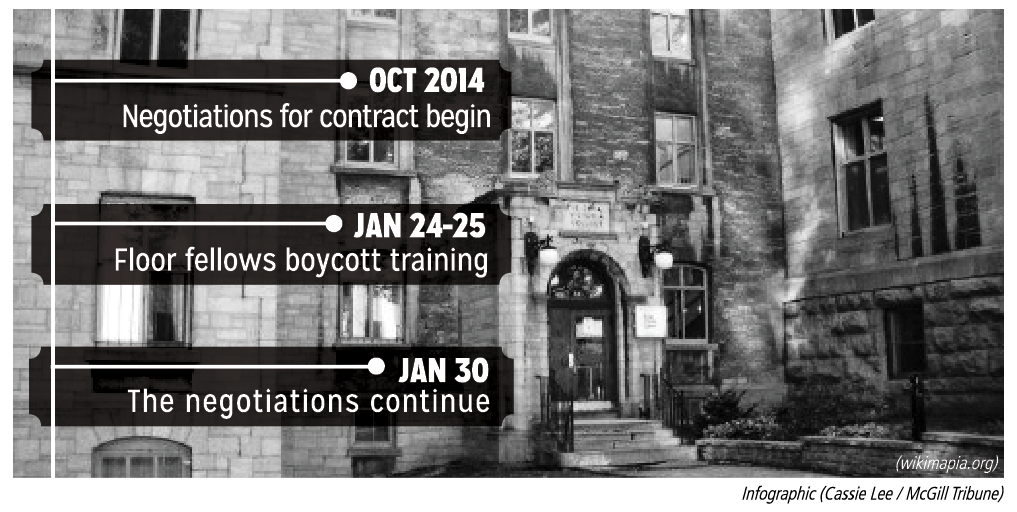Negotiations between the floor fellow bargaining unit of the Association of McGill University Support Employees (AMUSE) and the McGill administration continued on Jan. 30, following the floor fellow’s collective decision to boycott a training session on Jan. 24 and 25.
AMUSE and the administration have been in the process of negotiating a collective agreement since October. This collective agreement would be the result of a negotiating process between McGill and the floor fellow unit of AMUSE to alter the conditions of the current floor fellow contract. Recently, this process has been hindered by contention surrounding the inclusion of what the floor fellows have defined as core values, predominantly those of anti-oppression and harm reduction, into their contract.
The Director of Labour and Employee Relations at McGill Robert Comeau cited disagreements over what could be included in a collective agreement as the main cause for this roadblock.
“Normally, a collective agreement only defines the working conditions of the union members, so the attempt to include the ‘values associated with the role of floor fellows’ in the collective agreement is a significant departure from the norm,” he said.
Vice President floor fellow for AMUSE Christina Clemente commented on why the floor fellows want to institutionalize core values into their collective agreement.
“Part of it is writing down something about the way that residence works and functions, that’s why we’re pushing to have our approaches and philosophies written down,” Clemente explained. “A big part of it is having concrete things that will give security that residences will operate in the way we think it should. Another big thing is that the floor fellows should have some say in the decision making in what happens in residence, our jobs, and student life. We’re still working on that.”
The bargaining unit has agreed to hear a proposal from the McGill administration at the next negotiating session, which is scheduled for March. According to Amber Gross, AMUSE President, the administration appeared to be more responsive to the floor fellows’ requests since the boycott took place.
“We are happy to see that they are changing attitude and willing to work on strategies of including these values,” Gross said.
Comeau also expressed the administration’s satisfaction with the progress made during Friday’s session.
“While there is still a lot of work to do, we feel we may have found a way to address the union’s expectation that the ‘values’ that help govern the floor fellows roles will be included in the contract.” he stated.
However, Comeau did express disappointment at the floor fellows’ decision to boycott the training.
“Since the beginning of the negotiations, our negotiation committee has shown openness in addressing the floor fellows’ preoccupations,” he explained. “We would have appreciated it if the floor fellows had carried on business as usual; unfortunately the Floor Fellows who [chose] not to participate will be the ones who lose out, because this training was to provide them with more tools to do their job.”
The bargaining unit and AMUSE contend that the boycott effectively demonstrated their position to the administration without negatively impacting their students.
“It is one of the only pressure tactics that we can use on the McGill administration that wouldn’t affect any of our students,” said Evan McIlroy, an elected bargaining representative for the floor fellow unit of AMUSE.
Going forward, the floor fellows hope that the McGill community will take a stance on the negotiations, according to Gross.
“We want to put information out there but don’t want [the administration] to feel that we’re pressuring our students,” Clemente said.
“We will be looking to the SSMU [Students’ Society of McGill University] Council and other student associations to take a stance and support us,” added Gross.
The floor fellows emphasized that this support is based on making the facts of the situation available without compromising the floor fellows’ position as a student support system. McIlroy stated that the floor fellows are being cautious in terms of informing their own students about the negotiation process.
“There is a power-imbalance [between floor fellows and students] in certain ways, and we’re very aware of that,” he said.







